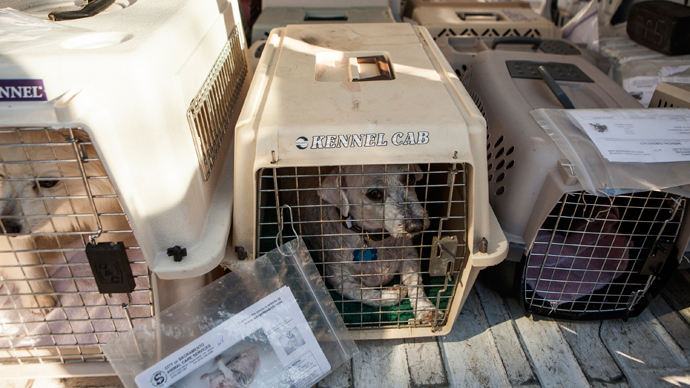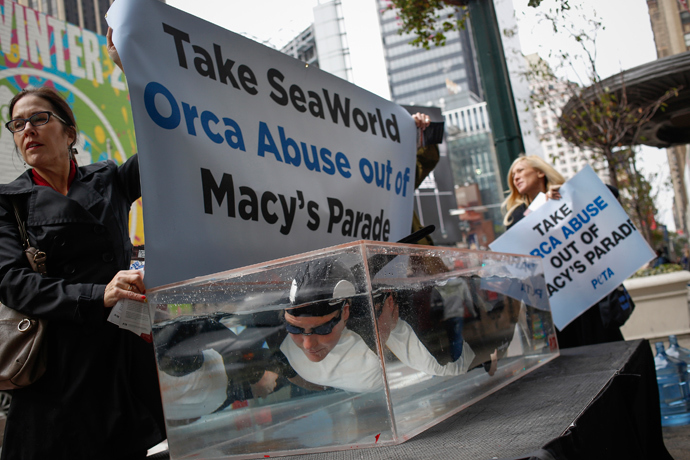Watchdog fail: PETA killed nearly 2,000 shelter animals in 2013 - report

People for the Ethical Treatment of Animals’ (PETA), known for its anti-fur campaigns, put down 1,792 stray cats and dogs at its shelter last year alone. PETA defends its work, saying euthanasia is sometimes the best option for animals.
The death rate per animal averages 5 per day. The 1,792 figure represents an 82 percent euthanasia rate of the total number of animals PETA brought to its Norfolk, Virginia shelter in 2013, according to an annual report by the Center for Consumer Freedom (CCF).
The numbers come from the Virginia Department of Agriculture and Consumer Services (VDACS), which requires records be submitted yearly for review. Since 1998, 31,190 animals have died at the hands of PETA.
Despite protests from several animal rights groups, PETA defends its record, insisting the animals it puts down are sick or unadoptable.
In 2005, PETA workers were arrested in North Carolina after killing adoptable cats and dogs and disposing of the bodies in a supermarket trash dumpster. Court evidence showed the employees euthanized animals they described as “perfect” and “adorable.”
Defendants Adria Hinkle and Andrew Cook were cleared of animal cruelty charges in 2007, according to the AP.
Will Coggin, senior research analyst at CCF, decried PETA’s actions. “This delusional animal rights group is talking out of both sides of its mouth – on one side preaching animal rights, while on the other signing the death warrant of 82 percent of cats and dogs in its care. Labeling PETA as hypocritical would be the understatement of the year.”

Coggin concluded, “PETA’s so-called ‘shelter’ might as well be called a slaughterhouse. For an organization that once disgustingly compared the treatment of farm animals to the Holocaust, you’d think PETA would avoid the appearance of systematic killing.”
According to the website, PETA Kills Animals, the animals rights group fails to find homes “for the deluge of animals it kills,” and “[D]espite its $32 million budget.”
The website pointed to past evidence that indicated PETA’s preference for the “death needle versus care and nourishment” once an animal is brought to its shelter. A 2010 inspection carried out by a VDACS veterinarian discovered that 84 percent of the animals PETA took in were killed within 24 hours.
PETA expressed its disagreement with the findings in a statement this week: 'PETA's shelter took in and euthanized 1,805 elderly, feral, sick, dying, aggressive, and otherwise unadoptable animals—more than 400 of whom were brought to PETA by loving but destitute guardians desperate to alleviate their beloved animals' suffering, and many others who had been turned away by local so-called "no-kill" facilities that reject unadoptable animals in order to keep their euthanasia statistics appealing.'
Daphna Nachminovitch, the head of PETA's cruelty investigations department, defends the use of euthanasia for animals in some cases: "Turning animals away or going to great lengths to convince people to keep animals they don't want - those things put animals in bad situations," she told the The Virginia Pilot.
Meanwhile, PETA’s practice of euthanizing adoptable animals is running up against public opinion as an increasing number of animal groups, including the Humane Society of the United States, are opting for a no-kill approach to handling animals.
In Virginia, for example, the animal euthanasia rate tumbled from about 85,000 dogs and cats killed in the state in 2011, compared with 103,000 in 2004.
PETA President Ingrid Newkirk previously indicated to The Virginian-Pilot that changing the animal right's group's policy may affect its future efforts.
“We could become a no-kill shelter immediately. It means we wouldn't do as much work,” she said.















